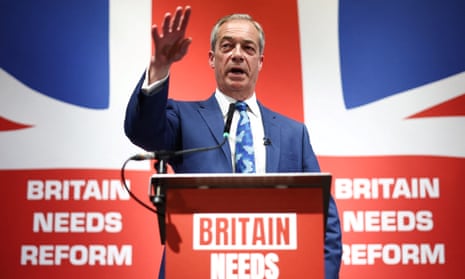Honorary president of the former Brexit party to make eighth attempt to enter parliament
The Conservative party’s faltering general election campaign suffered a potentially damaging blow when Nigel Farage announced he intended to stand as an MP and lead the Reform party for the next five years.
The former Ukip and Brexit party leader said he would stand in Clacton, Essex, after changing his mind while spending time on the campaign trail. He claimed that he did not want to let his supporters down.
Farage will also take over as leader of Reform UK from Richard Tice, pledging to stay in post for a full parliamentary term.
The Conservative party’s faltering general election campaign suffered a potentially damaging blow when Nigel Farage announced he intended to stand as an MP and lead the Reform party for the next five years.
The former Ukip and Brexit party leader said he would stand in Clacton, Essex, after changing his mind while spending time on the campaign trail. He claimed that he did not want to let his supporters down.
Farage will also take over as leader of Reform UK from Richard Tice, pledging to stay in post for a full parliamentary term.
While his announcement poses an immediate threat to the Tory candidate in Clacton, it may also energise his party’s national campaign, splitting the rightwing vote in other constituencies.
It also raises the spectre of Farage antagonising the Tories as they descend into a post-election battle for the soul of their party.
Farage’s bid to win in Clacton, which was the first to elect a Ukip MP in 2014 and has a Tory majority of 24,702, will be his eighth attempt to enter parliament. He has failed on each of the previous seven occasions.
At a news conference in central London, the rightwinger said that he had witnessed “a rejection of the political class” across the country in a way that had not been seen in modern times and that he wanted to lead a “political revolt”.
He also sought to portray Reform UK’s surge as part of what he described as “a new phenomenon” ahead of elections this weekend to the European parliament, when parties of the far right are expected to do well. “I promise you something is happening out there,” he said.
Farage had been expected to choose to run either in Clacton or in Thanet East, in Kent, which includes much of the old constituency where he made two failed bids to become an MP in 2015 and 2005.
But Clacton would now appear to be a better bet for Reform UK, even though the Tory candidate Giles Watling, who backed remain, is defending a majority of 24,702.
Farage suggested that Reform UK could take more than the 3.9m votes that Ukip won at the 2015 general election, before the Brexit referendum, and could even win some seats, although he acknowledged that it would be harder without proportional representation.
Reform UK is aiming to hive off votes from the Conservatives’ right flank, potentially splitting the vote in some marginal seats and allowing Labour through the middle.
“They are split down the middle on policy, and frankly right now they don’t stand for a damn thing,” Farage said of the Tory party. “So our aim in this election is to get many, many millions of votes. I’m talking far more votes than Ukip got back in 2015.”
Nigel Farage to stand for Reform UK in general election U-turn
3 posts
• Page 1 of 1
 Nigel Farage to stand for Reform UK in general election U-turn
Nigel Farage to stand for Reform UK in general election U-turn
-

dutchman - Site Admin
- Posts: 57493
- Joined: Fri Oct 23, 2009 12:24 am
- Location: Spon End
Re: Nigel Farage to stand for Reform UK in general election U-turn
Woman held after milkshake thrown at Nigel Farage
Two people have been arrested after Nigel Farage had a milkshake thrown over him while launching his personal election campaign in Clacton.
The Reform UK leader was leaving a pub after carrying out media interviews when a woman appeared to hurl a McDonald's banana milkshake over his face and suit jacket.
Essex Police said a 25-year-old woman was arrested on suspicion of assault.
While making the arrest, the force said a man was also detained on suspicion of assaulting an emergency worker.
"Both individuals remain in custody for questioning," a police spokesperson said.
The politician was walking out of the Moon & Starfish - part of the JD Wetherspoon pub chain run by prominent Brexiteer Tim Martin - to the Reform UK party bus at the time.
Mr Farage, who had milkshake thrown over him in Newcastle upon Tyne in 2019, appeared to make light of the incident later, posing with a tray of four milkshakes in the nearby village of Jaywick.

-

dutchman - Site Admin
- Posts: 57493
- Joined: Fri Oct 23, 2009 12:24 am
- Location: Spon End
Re: Nigel Farage to stand for Reform UK in general election U-turn
Woman, 25, arrested over Nigel Farage ‘milkshaking’ revealed to be Jeremy Corbyn-loving OnlyFans model
Victoria Thomas-Bowen, 25, was arrested by police on suspicion of assault after the Reform UK leader was drenched as he walked out of a Wetherspoons in Clacton, Essex.
She has used the stunt to promote her explicit content. Eight hours ago she posted on Instagram a picture of her in underwear with the comment ‘My milkshake brings all the boys to the yard’.
Pictures from the scene yesterday show a McDonald’s milkshake being thrown all over Mr Farage as he descended the steps of the pub while out campaigning.
He said the incident was ‘quite frightening’ but then posted a social media video himself saying ‘my milkshake brings all the people to the rally’.
Her brother Paul told MailOnline: “I have just seen it, and to be honest, I'm appalled. I don't know where she is. I don't want anything to do with her."
After the milkshake was thrown, Victoria said: “He doesn’t stand for me, he doesn’t represent anything I believe in, or any of the people around here.”
The incident has been roundly condemned by politicians.
Labour's Yvette Cooper said it was a 'disgrace' and 'completely unacceptable and wrong'.
Last night she posted a photo of herself dressed only in her underwear and sports socks in a provocative pose, alongside a link to her Onlyfans website and the lyrics to the song Milkshake.
She has previously voiced support for Jeremy Corbyn on Facebook.
After being drenched, Mr Farage told ITV: “I don't know what was thrown at me but it hit me in the face fair and square. Quite frightening.”
Former Reform boss Richard Tice, who was walking behind Mr Farage when he was struck, said: "The juvenile moron who threw a drink over Nigel has just gained us hundreds of thousands more votes. We will not be bullied or threatened off the campaign trail."
Essex police said yesterday: “ "It was reported a man had a drink thrown over him as he left a premises in the area. A 25-year-old woman, from Clacton, was arrested at the scene on suspicion of assault.
"While officers were responding and making this arrest, a second individual, a man, was arrested on suspicion of assaulting an emergency worker."
Source: https://www.lbc.co.uk/news/victoria-thomas-bowen-onlyfans-model-nigel-farage-milkshake/
Of course it'll fit; you just need a bigger hammer.
-

rebbonk - Posts: 72253
- Joined: Thu Nov 12, 2009 6:01 am
3 posts
• Page 1 of 1
Who is online
Users browsing this forum: No registered users and 7 guests
-
- Ads




